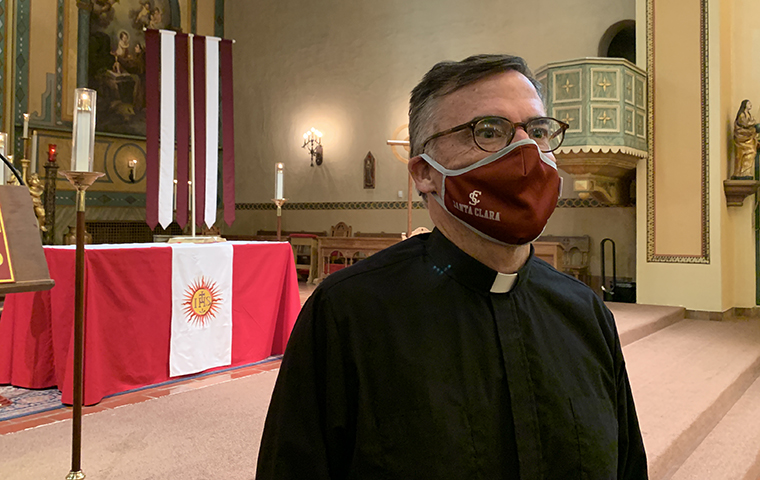
Mass of the Holy Spirit
In today’s Gospel (John 20: 19-23), we meet the disciples in hiding, locked in the upper room, after the crucifixion of their beloved Jesus. They are scared to go outside, fearing perhaps a similar fate or a widening persecution. They are sheltering in place, confused about what to do next. They are hurting. And into their midst, Jesus, the risen One, appears, wishing them “peace/shalom”, twice. He wanted to take away their fear and their anxiety.
On some level, we can relate to the disciples. We have been sheltering at home for a while now, and for good reason: protecting ourselves and our families from the COVID virus. Yet, like those disciples, we too at times are anxious about the future. We are hurting and sometimes fearful. We are frustrated, not know knowing how all of this ends.
Into our midst, wherever we are, at the beginning of this very peculiar academic year, the risen Lord meets us and wishes us “peace”. The risen Lord wants to console us, not by taking away all of our questions, not by making the virus magically disappear, but by assuring us that God is with us, and because of that promise, we will get through this and good will come of it.
The gospel writer describes this divine presence as very intimate and personal: the risen Lord breathes on his friends. In the Jewish scriptures, the word, ruah, means “spirit” but it also means “breath” and “wind.” So Jesus, getting close to his disciples, gives them a share of the Holy Spirit with a breath. This very human, vey divine breath gives new life to the disciples, in a way similar to the second creation story at the beginning of the Bible, when God breathes on clay to create the first human being. Those scared friends of Jesus are enlivened, stirred, fortified to be disciples, to be Jesus’ presence in the world: healing, teaching, caring, peace-building, justice making.
In a similar way, we experience the Spirit of God as breath when we receive soothing encouragement from a friend in times of difficulty, when we experience stillness of soul in our prayer or in nature, when we enjoy the quiet intimacy of someone we love, when we receive the soothing balm of forgiveness, when we are freed from fear and experience a quiet inner confidence to become who God calls us to be.
The image of breathing takes on other resonances for us today. We know that the coronavirus can take away breath. As he was dying on a street in Minneapolis in June, George Floyd yelled, “I can’t breathe.” God wants only to give life, but a virus or violence can take it away. In our own lives, God wants to give us peace, but we can get in the way. When we fear, there is little room for peace. When we resent, we get stuck in our locked upper rooms.
That’s why the other image of the Spirit in today’s readings is so helpful. In the dramatic scene from the Acts of the Apostles (Acts 2: 1-11), we hear: “And suddenly there came from the sky a noise like a strong driving wind,” filling the house. Here, the Holy Spirit is given to us not as a gentle, intimate breath, but as something more dynamic and powerful:
God shaking the rafters, God getting our attention. This is another way that we experience God’s Spirit.
We have felt the action of the Spirit as energizing presence when we become passionate about something we are doing or studying, when we are inspired by a bold insight or brim over with creative energy. This divine presence is reflected in the courage or confidence we feel deep down in a challenging situation. It’s what can repair the breach between people. it’s the prophetic motivation to name injustice and to labor tirelessly to root out systemic oppression and racism.
At the beginning of our academic year, we celebrate the gift of the Holy Spirit, the presence of God in our midst at Santa Clara, or wherever we might be as we connect to campus virtually. This divine presence, this Spirit, cannot be exhausted or reduced to one form or experience. Nor is it stifled when we are learning and living remotely.
We ask God to be with us as gentle breath. Console us. Comfort us. Encourage us. Give us hope. We ask God to be with as mighty wind. Inspire us. Motivate us. Challenge us. Help us stir up some good trouble, as John Lewis would say.
The Gospel ends with Jesus sending his disciples out to do the work of reconciliation, to share the peace given to them. The gift of the Spirit is not to be hoarded, but to be spent and shared. So we are called to leave our locked rooms – or liberate others from theirs—to soothe the hurts of others, to mend relationships, to be agents of restorative justice in a world too mired by divisiveness and alienation.
In our wake, please God, may we leave only peace, the peace that the risen Lord breathed upon his disciples and wants so desperately to give us and through us, our campus and our world.